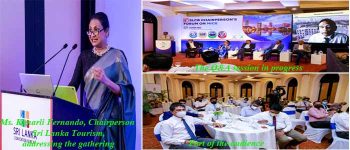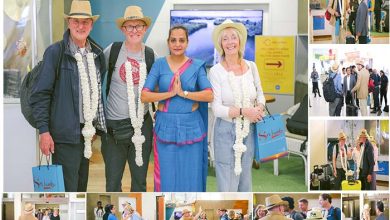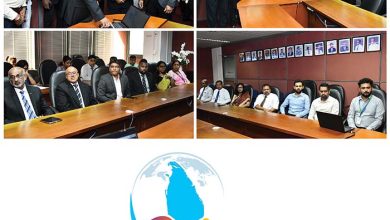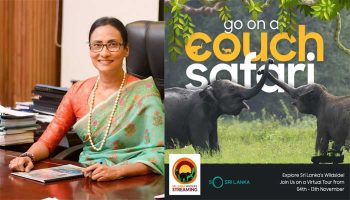“Sri Lanka Tourism: The Way Forward for Resilient, Inclusive, and Sustainable Development”


By
Prof DAC Suranga Silva
Professor in Tourism Economics, University of Colombo, Sri Lanka
Emails: drsuranga@econ.cmb.ac.lk; drsuranga3@gmail.com
Rebounding Global Tourism, Reconnecting Globe Expectations
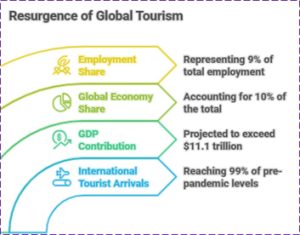 In 2024, the global tourism sector demonstrated a strong recovery, with international tourist arrivals reaching approximately 1.4 billion, nearly matching pre-pandemic levels at 99% of 2019 figures. The World Travel & Tourism Council (WTTC) projects that the sector’s contribution to global GDP will exceed $11.1 trillion in 2024, accounting for 10% of the total global economy and 9% of global tourism employment. This resurgence underscores tourism’s vital role in economic growth and job creation worldwide.
In 2024, the global tourism sector demonstrated a strong recovery, with international tourist arrivals reaching approximately 1.4 billion, nearly matching pre-pandemic levels at 99% of 2019 figures. The World Travel & Tourism Council (WTTC) projects that the sector’s contribution to global GDP will exceed $11.1 trillion in 2024, accounting for 10% of the total global economy and 9% of global tourism employment. This resurgence underscores tourism’s vital role in economic growth and job creation worldwide.
Insights into the Forces Shaping Global Tourism
 Global tourism is evolving rapidly due to various drivers. Sri Lanka must adapt to these to stay competitive:
Global tourism is evolving rapidly due to various drivers. Sri Lanka must adapt to these to stay competitive:
- Sustainability and Regenerative Tourism: Tourists increasingly prefer destinations that protect the environment and uplift local communities.
- Digital Transformation: Use of AI, big data, and mobile technologies for personalized travel experiences, smart tourism, and seamless service delivery.
- Health and Wellness Tourism: Demand is rising for wellness retreats, Ayurveda, yoga, and holistic healing — areas where Sri Lanka has a natural advantage.
- Experiential and Cultural Travel: Travelers now seek authentic, immersive experiences rather than traditional sightseeing.
- Safety, Hygiene, and Crisis-Preparedness: Post-COVID expectations around health safety, insurance, and infrastructure are permanent.
- Remote Work and Digital Nomadism: Growth in long-stay tourism and co-living spaces as professionals work remotely from attractive destinations.
- Green Investments and Climate Adaptation: Increasing funding for eco-projects and nature-positive tourism products.
A New Dawn for Inclusive and Sustainable Sri Lanka Tourism
 Sri Lanka’s tourism sector has shown a robust recovery. In 2024, the country welcomed 2,053,465 tourists, marking a 38.1% increase compared to the previous year. Tourism earnings for the year reached approximately $3.17 billion, reflecting a 53.2% year-on-year growth. The momentum continued into 2025, with 930,794 arrivals recorded by early May.
Sri Lanka’s tourism sector has shown a robust recovery. In 2024, the country welcomed 2,053,465 tourists, marking a 38.1% increase compared to the previous year. Tourism earnings for the year reached approximately $3.17 billion, reflecting a 53.2% year-on-year growth. The momentum continued into 2025, with 930,794 arrivals recorded by early May.
Key source markets include India, Russia, the UK, Germany, and Australia. Despite this positive path, challenges such as environmental degradation, inadequate infrastructure, service quality issues, economic vulnerability, high leakages, and unequal income distribution remain.
Sustainable and Inclusive Tourism Development – Shared Benefits and No One Behind
To sustain and enhance this recovery, Sri Lanka must adopt an integrated and inclusive sustainable tourism development approach. This entails coordinating efforts across economic, social, and environmental dimensions to promote comprehensive and mutually reinforcing growth. An inclusive development approach emphasizes involving all societal segments, especially marginalized groups, to ensure equal opportunities and active participation. This strategy reduces social inequalities, fosters shared ownership, and strengthens social cohesion and stability, thereby supporting a more balanced and equitable growth model.
From Linear to Circular Tourism Economy – Closing the Loops for Regenerative Tourism
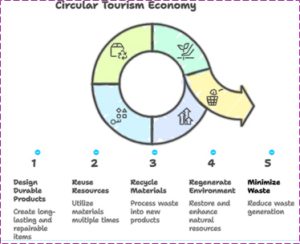 Sri Lanka’s tourism industry currently follows a traditional linear economy model characterized by a “Take-Make-Waste” approach, leading to resource depletion, excessive waste, and environmental harm due to short-term profit priorities and conspicuous consumption. In contrast, the circular tourism economy model promotes a closed-loop system where resources are reused, recycled, and regenerated to minimize waste and extend product lifecycles.
Sri Lanka’s tourism industry currently follows a traditional linear economy model characterized by a “Take-Make-Waste” approach, leading to resource depletion, excessive waste, and environmental harm due to short-term profit priorities and conspicuous consumption. In contrast, the circular tourism economy model promotes a closed-loop system where resources are reused, recycled, and regenerated to minimize waste and extend product lifecycles.
This model focuses on designing durable and repairable products and services to enhance sustainability and resource efficiency throughout the tourism value chain. According to the UN World Tourism Organization, sustainable tourism must fully account for its economic, social, and environmental impacts, addressing the needs of visitors, the industry, the environment, and host communities.
From Policy to Practice: Enabling Circular Tourism in Sri Lanka
Several key factors are driving Sri Lanka’s transition toward a sustainable circular tourism economy:
- Global Demand for Sustainable Travel: Emerging global tourists increasingly seek sustainable travel products.
- International Organizational Pressure: Global bodies advocate for sustainable practices in tourism.
- Corporate Social Responsibility (CSR) Initiatives: Businesses are adopting CSR practices that support sustainability.
- Government Regulations: Policies supporting environmental protection encourage sustainable tourism.
- Market Incentives: Long-term cost-effectiveness motivates sustainable practices.
- Technological Innovations: Advancements in renewable energy and recycling systems support sustainability.
- Commitments to Sustainable Development Goals (SDGs): Aligning tourism practices with SDGs promotes sustainability.
- Investor Incentives: Incentives for investors adopting sustainability initiatives encourage the embrace of circular economy principles.

The Synergy for Tourism Sustainability: Unlocking the Full Value of Tourism Development
By aligning with global tourism trends and embracing circular economy principles, Sri Lanka can strengthen its market image as a sustainable destination, attracting eco-conscious travelers and supporting local communities. An integrated and inclusive development approach offers multiple benefits, which can be presented through the Concept of Seven Es (7Es):

- Effectiveness: Achieves long-term multifaceted tourism growth.
- Efficiency: Enhances coordination among stakeholders.
- Equity: Addresses social inequalities and ensures fair distribution of benefits.
- Endurance: Builds capacity to withstand economic and environmental shocks.
- Engagement: Fosters inclusive participation of Stakeholders with their trust.
- Encourage: Promotes Product Diversity through a variety of tourism products catering to different market segments.
- Ensure: Ensures fair distribution of tourism income among all contributors.
Turning Vision into Strategic Action
To realize these benefits, Sri Lanka Tourism should implement the following measures:
- Multisectoral Collaboration: Foster partnerships among governments, tourism practitioners, environmental groups, local communities, and businesses to enhance industry sustainability.
- Evidence-Based and Participatory Decision-Making: Utilize research-driven data to create effective policies that reflect community needs and environmental protection.
- Fair Sharing of Tourism Benefits: Prioritize equitable distribution of tourism revenue to support local communities and reduce income disparities.
- Good Governance and Transparency: Implement clear regulations, eco-certifications, regular audits, and transparent use of tourism revenues to build stakeholder trust.
- Productivity and Efficiency: Adopt advanced technologies and empower human resources through education and training in sustainable tourism practices.
- Innovation: Invest in research to adapt to global tourism trends and minimize environmental impact.
- Entrepreneurial Development: Create a conducive macro environment, favorable policies, financial incentives, and infrastructure development to support entrepreneurship.
Connecting Sri Lanka Tourism with Ongoing Economic Transformation
Sri Lanka’s economic recovery and transformation efforts are expected to focus on:
- Export-Led Growth and Foreign Exchange Stability
Tourism is seen as a major foreign exchange earner to reduce dependency on imports and improve balance of payments. - Private Sector-Led Development
Greater public-private partnerships (PPPs) are expected in sectors like tourism, enabling infrastructure expansion and innovation. - SME and Rural Economy Empowerment
Supporting SMEs and rural communities through inclusive tourism ventures can contribute to more balanced regional development. - Digital Economy and Innovation
The government is pushing for digitalization and innovation, which can modernize the tourism sector and attract new market segments. - Green Economy Transition
 Encouraging Sri Lankan economy to shift for low-carbon economic models by promoting renewable energy, resource efficiency, and social inclusion, aiming for environmental protection, economic growth, and climate change mitigation.
Encouraging Sri Lankan economy to shift for low-carbon economic models by promoting renewable energy, resource efficiency, and social inclusion, aiming for environmental protection, economic growth, and climate change mitigation.
Sri Lanka’s tourism strategy must act as a catalyst for economic transformation by aligning with both global trends and national policy priorities as the strategic pillars for sustainable and inclusive tourism development.
Transforming Sri Lanka Tourism: Pillars for Progress and Prosperity
- Sustainable and Inclusive Growth
- Promote community-based tourism and rural tourism ventures to ensure fair income distribution among local populations.
- Encourage adoption of green certifications and regenerative tourism initiatives to enhance Sri Lanka’s reputation as a sustainable travel destination.
- Smart and Digital Tourism
- Invest in smart tourism infrastructure such as e-visa platforms, digital tour guides, online booking hubs, and AI-driven analytics for efficient destination management.
- Utilize big data and social media for accurate demand forecasting and targeted marketing campaigns.
- Wellness and Ayurveda Hub
- Establish Sri Lanka as a global wellness tourism center by leveraging its rich Ayurvedic heritage, pristine beaches, and tranquil natural environments.
- Long-Stay and Nomadic Tourism
- Develop long-term visa options, co-working spaces, and robust digital infrastructure to attract digital nomads and long-stay tourists seeking flexible travel experiences.
- Infrastructure and Investment
- Integrate tourism zone development (e.g., Passikudah, Kalpitiya) with economic corridors and smart city projects to boost appeal for both tourists and investors.
- Promote public-private partnerships (PPP) for developing hotels, eco-lodges, airports, and transport networks to enhance connectivity and accommodation capacity.
- Policy, Governance and Capacity Building
- Strengthen institutional governance, simplify regulations, and empower destination management organizations (DMOs) to lead adaptive, localized tourism planning.
- Focus on training and education in hospitality, sustainability and digital skills to cultivate a highly skilled tourism workforce.
Final Note
Sri Lanka can drive sustainable economic growth by aligning its tourism sector with global trends like sustainability, digital innovation, and wellness tourism. Embracing a circular economy, community-based initiatives, and smart investments will position the country as a resilient and inclusive destination, boosting both recovery and long-term development.


